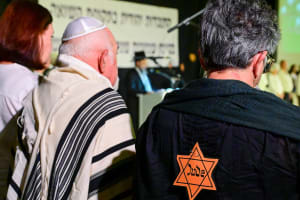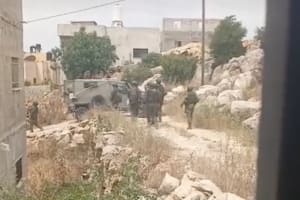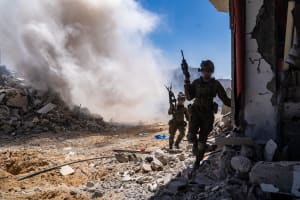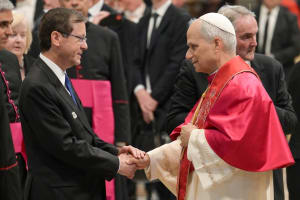Survivors of the Exodus 1947 ordeal share their stories
Christian journalist Paul Calvert speaks with 5 survivors
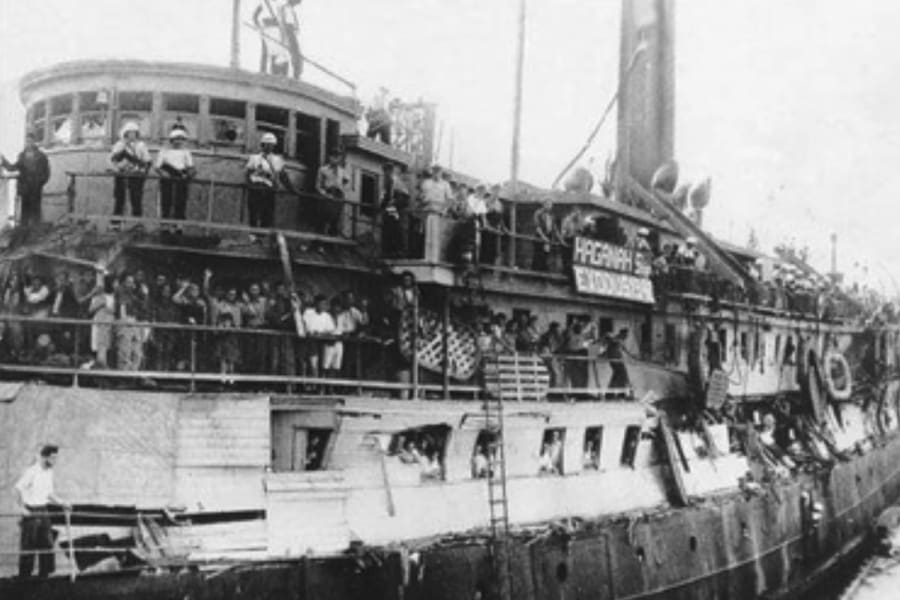
In one place in the Land of Israel this year, there was a Passover Seder like no other.
Christian journalist Paul Calvert of Bethlehem Voice Radio attended the Seder at the former British detention camp in Atlit – just south of Haifa – and interviewed survivors of the perilous Exodus 1947 ship ordeal.
The traditional annual Seder meal, which commemorates the Exodus of the Jewish nation from Egypt, features a story-telling booklet called a ‘Haggadah.’ Because it is so important for the Holocaust survivors – many of whom also survived harsh British intervention during their escape from Nazi Europe – the Atlit museum is often a gathering place for them, as well as an educational center.
“Now we [have] prepared a Haggadah about the Exodus ship, the telling the story of the Exodus 1947, from the diary of ‘ma’apilim,’ the immigrants,” Yaakov Waiman, the organizer, explained.
The Exodus 1947 was an American ship (originally the SS President Warfield) that was refitted to transport more than 4,500 Jewish refugees, mainly Holocaust survivors, illegally to British Mandate Palestine. Setting sail from France in July 1947, the ship's passengers defied British immigration quotas that severely restricted Jewish entry into the territory. This act of defiance made the Exodus 1947 a significant historical symbol of the Jewish struggle to establish a homeland – the State of Israel in 1948.
One of 4,515 refugees and volunteers, Waiman’s mother was a young woman aged 23 or 24 aboard the Exodus after surviving Auschwitz and other Nazi concentration camps. She was hospitalized in Haifa after being injured during the British military's takeover of the dilapidated vessel, an attack that killed three passengers – two of whom were Holocaust survivors aged 15 and 24 – and wounded many others.
Attending the special seder were five elderly ma’apilim, one aged 90, as well as their family members. They told Calvert their stories.
Ze’ev Arnon
“I am 90 years old. When I was on Exodus I was 13 years old.”
Arnon was born in Budapest in 1934, and his family was defenseless in the face of Nazism.
“My father was killed by the German army,” he told Calvert. “We must take Yellow Star of David here,” Arnon explained, pointing to his chest.
“Once when I went in the street, a group of Hungarian children catch me and hit me very hard. And people in the street ask the children, ‘Why?’ They said, ‘Because I am a Jew.’ The [adults] said, ‘Continue, you can continue.’"
Following the incident, German soldiers intervened and the family ended up in a house marked by a yellow star. “And they tried to take my mother to Auschwitz, but she succeeded to come back,” said Arnon. In another apparent miraculous turn of events, the family obtained a certificate of protection from a neutral embassy.
Then when Hungary elected the fascist Arrow Cross party, the young Arnon and his family were moved to the city’s Jewish ghetto, until the liberation by the Red Army in January 1945.
At first, his mother didn’t agree with the desire of her sons to go to Israel, he explained. “But after a very big antisemitic demonstration in Budapest, she said, ‘You must, maybe it is better you go to Eretz Israel.’"
The refugee boys were in Germany for almost two years, after which they managed to get to the French harbor, where many Jewish young people had high hopes of returning to the Promised Land. Instead, Arnon said, they were “on the Exodus, came back to France and after it to Germany,” in what became one of the most profoundly ironic return journeys in history.
Finally, in 1948, the brave teenager arrived in Israel. After some time in Ben Shemen, a youth village and agricultural school, Arnon found a home in a kibbutz.
“There I married with Dora, and we have three children, 11 grandchildren and three great-grandchildren,” he said proudly, adding: “I think it is an [answer] to the German. They wanted to destroy us…"
"…And I say all the people, all the Jews, must live in Israel - even [after] what happened.”
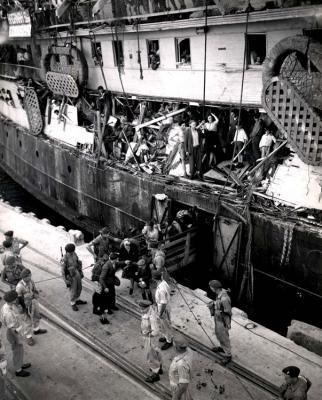
Esther Rubinstein
“I was ten years old. I was in a group called ‘Dror’ [meaning ‘freedom’ – a Zionist Socialist Federation that originated in Kyiv]. They had a guide and a female guide, too. They were like our parents,” Rubenstein told Calvert.
The Dror youth group was in a German camp. Rubinstein’s parents were also in the camp. She said her two sisters and brother went ahead to Israel, but the British caught them and sent them to the prison camps in Cyprus.
“When we came to Haifa port,” Rubinstein recalled, “there was a long building, and the English people – they were there, and [they had pumps containing] DDT. So everyone had the spray of the DDT and then…”
All of this took place before the little girl was taken from her homeland, and onto another ship, the Empire Rival, bound for France. Rubinstein remembers that her youth group guides were so helpful, and enabled them to overcome the very difficult situation.
“…They told us that we were going to be taken to the camps in Cyprus. We were waiting one day, two days, three days,” Rubinstein explained, describing the uncertain period between Haifa and Cyprus, when she knew her sisters and brother were waiting for her there.
“The [British said], ‘We prepare a place for you; we prepare a place for you. So we wait, wait, wait. That’s what I know, but I was only ten years [old] and nobody tell me something what [was] happening. Only the older [ones] knew what happened."
“But they didn’t take us to Cyprus. There wouldn't have been space for 4,500 people there.”
Rubinstein heard later that they had prepared a camp in Cyprus for the refugees of the Exodus but she didn't know the political reasons why they were not taken there.
Rubinstein was in a group of about 30 children, and they were given fruit conserves by the British. She recalled that these jars of jam became weapons used against the British in the battle. The children handed them over to the older youths who were actively resisting the British forces that boarded the Exodus in an attempt to take control of the vessel.
“It was very difficult on the [second] ship - very. It was iron. It was hot, like fire,” the now 88-year-old remembered. “The English people, to the children, they were nicely a little bit, on the English ship. It was one hour in the day, they put the children and they [allowed] them to be on the deck of the ship, to see a little bit the sun. It was many children on the ship; it was many children. The deck was not big - it was small - so one hour for these children and then one hour for other children.”
Rubinstein told Calvert that the biscuits they were given by the British while sailing had been full of worms. She said she thinks the Brits themselves were eating these same biscuits. The survivors still joke about this now, saying, “Those biscuits must have been from the First World War!”
When they arrived in France, the Haganah – the Jewish paramilitary organization, mostly made up of volunteers – were in little boats around the deportation ships. Rubenstein said they shouted, ‘Don’t get off! Don’t get off the ship. We must come to Israel!’ So nobody left the ship.
“Two people who were ill, and a lady who was pregnant, got off the ship. The food had run out, but the French did give us baguettes and croissants,” she said.
Waiman, whose mother endured the Exodus voyage, explained that her fellow refugees were on the metal cargo ship for about three and a half weeks, in the heat of July and August 1947.
“All of the time when they entered the Exodus and until they returned to Germany, it was about 60 days at sea – 60 days,” he said incredulously.
After arriving in Hamburg, the British took the exhausted Jews to yet another camp, Papendorf. The Haganah advised against giving names.
“So, my certificate was my face, and three, four, three. This was my number,” recalled Rubinstein. “So, if they wanted something from me, they said, ‘343! Come to the office.’
“What I want [to know] is the point of [the fact that there were] watchtowers in Papendorf,” she asked agonizingly. There was a light and the guards would watch them, even the children, as they went back and forth to the toilet.
“Till now it’s [painful] in my heart. Why? I am so small and I am alone,” she said, of her 10-year-old self. “Where I can run away? Where I can go?”
After Israel was re-established as a state in 1948, the young Jewess was free to come home. She lived in Kibbutz Dafna, completed her military service, married and studied medicine, specializing in radiology. Rubinstein worked 42 years in one hospital, including as head of the X-ray department, and is still going strong.
“I have three daughters, nine grandchildren and five great-grandchildren. I’m 88 and I’m still working, [helping people with] breast cancer.”
Moshe Soroka
Twenty-two babies were born on board the Exodus, and Moshe Soroka was one of them.
“It is history from our family,” said Soroka, responding to why he had come to the event.
“He didn't sleep in the night,” added his wife, who helped to tell the story. “Every time we meet the people he’s very, you know, he doesn’t sleep and he’s very happy to see them again. It’s very emotional.”
Baby Moshe traveled with his father, mother and [step]sister. Her mother died in Treblinka.
“My father worked in Treblinka,” Soroka explained. “[His] job was to take out all the people who died.”
Mrs. Soroka continued: “And suddenly, he saw his wife, died there. So he ran out. He was very emotional.” And there, he later met his second wife, the mother of Moshe.
Baby Moshe was circumcised in the hospital in Marseille, France. From Marseille, the baby and his parents came to Israel aboard the Exodus. From Israel, this baby went back to Marseille and then back to Germany, before finally coming to Israel.
Moshe’s wife explained that her husband is so happy to meet with other second-generation survivors since his mother could not speak about what happened. “No speak, nothing,” he added.
“They can’t talk,” Mrs Soroka continued. “They didn’t tell anything to the children. At night, the father was screaming, crying, his mother also.”
Soroka recalled not being able to tell his friends that his father was crying at night. He was afraid that they would laugh at him. He became a soldier in the elite parachute regiment.
One day, while his father was in the hospital, Soroka visited him wearing the distinguished red beret. It was the first time his father cried in front of him, telling him that he was so proud of him.
“Now, I’m not afraid, now that my father spoke to me,” said 76-year-old Moshe. “After this moment, [his father] spoke for many hours about everything,” said Mrs. Soroka.
The couple's son now gives lectures in “all the schools around our place,” she said, proudly. “[In] every school he gives a lecture, with photos, beautiful… They (the survivors) live with it inside.”
“And I very happy for this,” added Soroka, who is now very proud to say, “My son is in the army; my son-in-law is in the army.”
Menachem Shefi
“My parents are Holocaust survivors. They are both from Warsaw, Poland, and they belonged to the Hashomer Hatzair youth movement,” Shefi told Calvert.
Both of Shefi’s parents managed to escape to Russia during the war, but he isn’t sure how they found each other again at the end of the war. Like many other Jewish young people, they were organized into a group on a kibbutz in Poland, and then gathered in South Germany, waiting to make aliyah (immigrate) to Israel. The kibbutz was called ‘Bein Gvulot’ (meaning ‘between borders’), the name of a well-known Hebrew song.
“My mother was pregnant with me when the Exodus event happened,” Shefi explained. “She was in her seventh month [of] pregnancy, and the whole journey [aboard] Exodus to Haifa – and the return with the British ships to France, and the continued [journey] to Hamburg – [she] was in the eighth and the ninth months of pregnancy.”
Shefi was born two weeks after the ships entered Hamburg harbor. “I was born in Papendorf,” he said, the same place where young Esther Rubinstein found herself.
“It was a British military camp next to Lubeck, and I was born in a Latvian hospital in Lubeck, and [my parents] stayed, like all the refugees, in that camp.”
After two months they moved to another camp called Emden, close to the Dutch border.
“And when I was, I think, 11, 12 months old,” said Shefi, “they started the whole movement from South Germany through France to immigrate to Israel. The Independence Day of Israel was 14 May 1948, and we immigrated to Israel in September 1948, which means the state was four months old.”
The family arrived at a camp where all the immigrants gathered, and from there, were sent to different locations throughout Israel. Baby Menachem, (his name means ‘Comforter’ in Hebrew) and his parents were sent to a small village called Kfar Ono.
“Today it’s a great town with about 45,000 people,” he said. “And we still live in the same place where [I spent] all my youth, all the elementary school, high school I passed there. And I have a nice family with four kids and, at the moment, 13 grandkids. I studied chemistry in the university and I worked as a chemist in a hospital, in pharmaceutical companies, and so on.”
Shefi said it was important for him to bring his grandchildren to Atlit, to see the place and to experience the event. Sharing stories with new generations is vital for the survivors.
Back in the days of the Polish kibbutz, his parents were friends with another attendee of the Passover Seder, Yaffa.
Yaffa Pass
“My story is very interesting and very exciting,” Pass began.
“If you know, the British sent us back. They wanted us to be in France, but they sent us back to France on three ships. And [on] the way there, I was born."
“But we didn’t want to get [off] at France. We want only to be in Israel. So the British didn’t know what to do. And they sent us on the three boats – it wasn’t ships, boats – back to Germany, to Hamburg.”
The birthplace of this Jewish refugee baby girl was the MV Runnymede Park. If it sounds British, it’s because it is: An English place name.
“And why my story is so interesting and exciting?” Pass asked. “Because 50 years [later], I met the doctor who [brought] me into the world.
“He was living in Wales and he was in Haifa when the Exodus arrived there. And when the British sent us back, he was on the Runnymede Park."
“I have to tell you that I don’t know many children who met the doctor,” she said laughing. “And it was a meeting that I didn’t forget, I think all my life.”
Pass has served as a teacher in Israel's Education Ministry for many years and said the story of the Exodus ship is very important because it symbolizes the significance of Israel for the Jewish people.
“Because we haven’t another land,” she said. “It’s the only land that is ours. And it’s very important that the children, students and everybody will understand it.”
Pass hopes the unique Exodus version of the Haggadah that was used during the Passover Seder will be translated into English, “so many people in the world will know about the story.”
In answer to Calvert’s question about the current rise of antisemitism in Europe, Pass repeated: “Yes, that’s the reason that the story of Exodus is really important, because every Jew at the end knows that the only place that he can be [in] safety is here.”
Click below to listen to the interviews in full.

The All Israel News Staff is a team of journalists in Israel.
You might also like to read this:


